Hyundai Kona VS Kia Niro
Hyundai Kona
The Hyundai Kona blends a bold design with a versatile interior, making it a standout choice in the compact SUV market. Its crisp handling and responsive steering provide an engaging driving experience, whether in the city or on the open road. The vehicle also offers a range of features designed to enhance comfort and connectivity, ensuring a pleasurable journey for both driver and passengers.
more informationKia Niro
The Kia Niro presents itself as a versatile and eco-friendly SUV, blending a stylish design with advanced hybrid technology. Its spacious interior offers comfort and practicality, making it ideal for both city driving and longer journeys. With a focus on efficiency and sustainability, the Niro is a compelling choice for environmentally conscious drivers.
more information @ hyundai.news
@ hyundai.news
 @ hyundai.news
@ hyundai.news
 @ hyundai.news
@ hyundai.news
 @ hyundai.news
@ hyundai.news
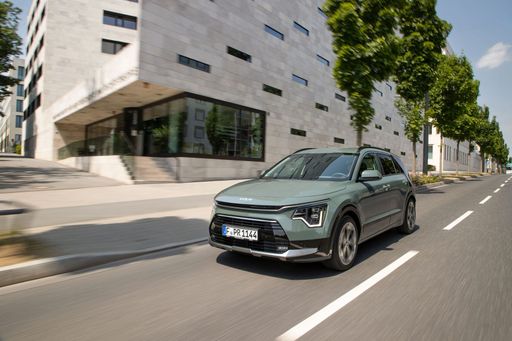 @ press.kia.com
@ press.kia.com
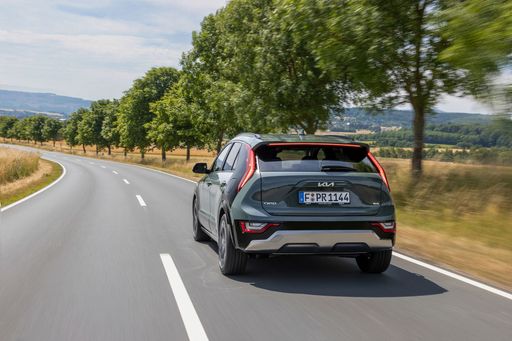 @ press.kia.com
@ press.kia.com
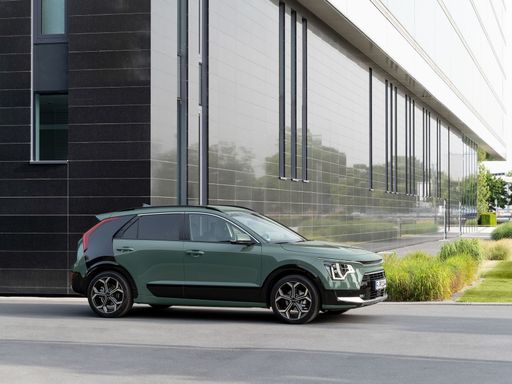 @ press.kia.com
@ press.kia.com
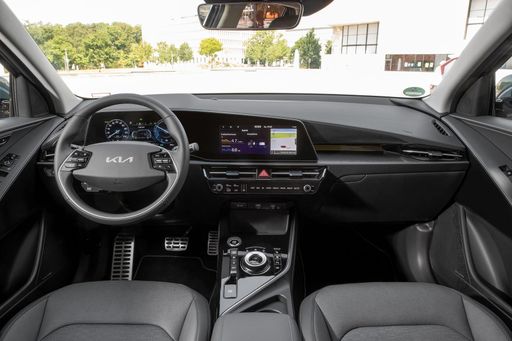 @ press.kia.com
@ press.kia.com
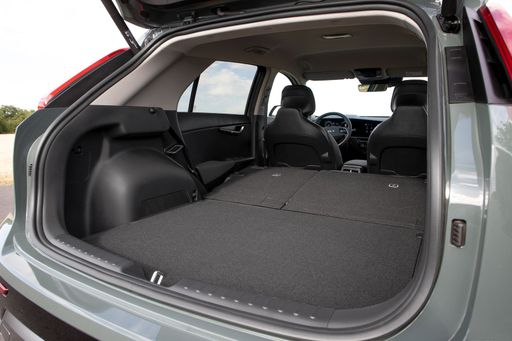 @ press.kia.com
@ press.kia.com
Costs and Consumption |
|
|---|---|
|
Price
about 22600 - 41600
£
|
Price
about 28100 - 37800
£
|
|
Consumption L/100km
4.5 - 6.7
L
|
Consumption L/100km
0.8 - 4.4
L
|
|
Consumption kWh/100km
14.6 - 16.8
kWh
|
Consumption kWh/100km
-
|
|
Electric Range
377 - 514
km
|
Electric Range
65
km
|
|
Battery Capacity
1.3 - 65.4
kWh
|
Battery Capacity
1.3 - 11.1
kWh
|
|
co2
128, 103, 141, 152, 0
g/km
|
co2
19 - 100
g/km
|
|
Fuel tank capacity
38 - 47
L
|
Fuel tank capacity
37 - 42
L
|
Dimensions and Body |
|
|
Body Type
SUV
|
Body Type
SUV
|
|
Seats
5
|
Seats
5
|
|
Doors
5
|
Doors
5
|
|
Curb weight
1370 - 1773
kg
|
Curb weight
1474 - 1594
kg
|
|
Trunk capacity
466
L
|
Trunk capacity
348 - 451
L
|
|
Length
4350 - 4385
mm
|
Length
4420
mm
|
|
Width
1825
mm
|
Width
1825
mm
|
|
Height
1580 - 1585
mm
|
Height
1545
mm
|
|
Payload
420 - 490
kg
|
Payload
466
kg
|
Engine and Performance |
|
|
Engine Type
Petrol, Full Hybrid, Electric
|
Engine Type
Full Hybrid, Plugin Hybrid
|
|
Transmission
Manuel, Automatic
|
Transmission
Automatic
|
|
Transmission Detail
Manual Gearbox, Automat. Schaltgetriebe (Doppelkupplung), Reduction Gearbox
|
Transmission Detail
Automat. Schaltgetriebe (Doppelkupplung)
|
|
Drive Type
Front-Wheel Drive, All-Wheel Drive
|
Drive Type
Front-Wheel Drive
|
|
Power HP
100 - 218
HP
|
Power HP
129 - 171
HP
|
|
Acceleration 0-100km/h
7.8 - 13.3
s
|
Acceleration 0-100km/h
10.4 - 11.3
s
|
|
Max Speed
162 - 208
km/h
|
Max Speed
160 - 161
km/h
|
|
Torque
200 - 265
Nm
|
Torque
265
Nm
|
|
Number of Cylinders
3 - 4
|
Number of Cylinders
4
|
|
Power kW
74 - 160
kW
|
Power kW
95 - 126
kW
|
|
Engine capacity
998 - 1598
cm3
|
Engine capacity
1580
cm3
|
|
Top speed
162 - 208
km/h
|
Top speed
160 - 161
km/h
|
General |
|
|
Model Year
2024
|
Model Year
2024
|
|
CO2 Efficiency Class
D, C, E, A
|
CO2 Efficiency Class
C, B
|
|
Brand
Hyundai
|
Brand
Kia
|
Hyundai Kona
The Hyundai Kona: A Comprehensive Overview
The Hyundai Kona has established itself as a standout in the compact SUV segment, blending innovation with performance and style. As the automotive world moves towards more sustainable and efficient options, the Kona offers a variety of powertrains, from traditional petrol engines to full hybrids and all-electric models.
Powertrain Options and Performance
The Hyundai Kona's powertrain choices cater to a wide range of preferences. For petrol enthusiasts, the Kona offers a 1.0L T-GDI engine, delivering 100 PS, and a more robust 1.6L T-GDI variant with up to 170 PS. Those looking for efficiency without sacrificing power can consider the full hybrid model, offering 129 PS and an impressive consumption of 4.5 L/100km.
For a greener option, the all-electric Kona provides a compelling case. With battery capacities of up to 65.4 kWh, the electric Kona offers power outputs of 156 to 218 PS, and efficiencies as low as 14.6 kWh/100km, enabling an electric range of up to 513 km.
Technical Specifications and Innovations
Built on a robust platform, the Kona delivers versatility and reliability. With a choice between manual or dual-clutch automatic gearboxes, along with options for front-wheel or all-wheel drive, the Kona ensures a tailored driving experience. The handling is enhanced by the car's lightweight construction, balancing a 1370 to 1773 kg curb weight with dynamic performance.
The Kona's design doesn't compromise cargo space for style; it offers a generous 466 L boot capacity. With a relatively compact body, measuring 4350 to 4385 mm in length, the Kona easily navigates urban environments while still commanding a strong road presence with its 1825 mm width.
Efficiency and Eco-Friendliness
Hyundai is committed to reducing emissions, as evidenced by the Kona's CO2 efficiency ratings, which range from class A for electric models to class D for some higher-performance petrol variants. The focus on reducing environmental impact without sacrificing driving pleasure is notable throughout the Kona range.
Costing and Value
The Hyundai Kona offers commendable value for money. Pricing starts at €26,400 and reaches up to €50,690, depending on the chosen configuration. The monthly running costs range from €956 to €1090, with a cost per kilometre of 38.3 to 43.6 cents, making it a competitive option in its class.
Conclusion: Modern, Efficient, and Versatile
The Hyundai Kona stands as a testament to Hyundai's commitment to innovation, efficiency, and practicality. Whether you are inclined towards a traditional combustion engine, a hybrid for a balance of power and efficiency, or a full electric model for maximum eco-friendliness, the Kona provides a tailored solution for each unique driver preference.
Kia Niro
The Evolution of the Kia Niro: A Glimpse into the Future
The Kia Niro has become a symbol of innovation in the hybrid and electric vehicle market. This compact SUV offers a unique blend of efficiency, performance, and style, appealing to a wide range of drivers. Kia Niro's latest model lineup showcases different powertrains, offering consumers choices between full hybrid, plug-in hybrid, and full electric options. These advancements represent Kia's commitment to sustainable mobility and cutting-edge technology.
Performance and Efficiency: Behind the Wheel of the Kia Niro
The performance range of the Kia Niro is impressive, with power outputs ranging from 129 PS in the full hybrid variant to 204 PS in the completely electric version. This ensures that there’s a Niro to meet diverse driving needs and preferences. The acceleration from 0-100 km/h spans between 7.8 to 11.3 seconds across different models, showcasing a balance between efficiency and responsiveness.
Fuel and energy consumption figures are equally commendable. With the hybrid models consuming between 0.8 to 4.4 litres per 100 km and the electric model utilising 16.2 kWh per 100 km, the Kia Niro caters to eco-conscious consumers. Notably, the plug-in hybrid version offers a remarkable electric range of up to 65 km, while the fully electric model boasts an impressive range of 460 km on a single charge.
Innovative Features for Today’s Driver
Kia has equipped the Niro with state-of-the-art features aimed at enhancing the driving experience. The latest models come with advanced driver assistance systems, ensuring safety and convenience. These include lane-keeping assist, adaptive cruise control, and collision avoidance technologies that set a high standard in the compact SUV class.
The Niro also benefits from a sleek infotainment system featuring a high-resolution display, offering seamless connectivity with features like Apple CarPlay and Android Auto. This keeps drivers connected while minimising distractions, creating an optimal driving environment.
Design and Practicality: A Perfect Balance
The Kia Niro stands out with its aerodynamic design, which is both aesthetically pleasing and practical. The dimensions of the vehicle – 4420 mm in length, 1825 mm in width, and a height ranging from 1545 to 1570 mm – provide ample space for passengers and cargo. The boot capacity ranges from 348 to 475 litres, catering to those who require versatility for their lifestyle or family needs.
The Niro’s cabin is crafted with a focus on comfort and usability, incorporating high-quality materials and an intelligent layout that complements its sophisticated exterior.
Sustainability and Cost Efficiency
The Kia Niro reflects Kia's dedication to improving environmental performance. The CO2 emissions spectrum, ranging from 0 to 100 g/km depending on the powertrain, highlights the vehicle's eco-friendly credentials. For those particularly conscious of their environmental footprint, the electric and plug-in hybrid models offer substantial reductions in emissions.
In terms of cost, the Niro offers competitive pricing from €32,790 to €47,590, and operational costs ranging from €928 to €1,101 per month. The Niro also maintains a reasonable cost per kilometre, between 37.1 to 44.1 cents, making it an economically sound choice in the long run.
Conclusion: The Future is Bright for Kia Niro
The Kia Niro stands as a testament to Kia’s innovative spirit and commitment to providing eco-friendly and technologically advanced vehicles. Its blend of performance, efficiency, and innovative features make it a compelling option for those seeking a future-focused SUV. As Kia continues to evolve, the Niro remains a leading example of how the brand is shaping the future of driving.
